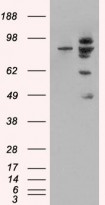ARG63943
anti-MDM2 antibody
anti-MDM2 antibody for Western blot and Human
Cancer antibody; Cell Biology and Cellular Response antibody; Gene Regulation antibody
Overview
| Product Description | Goat Polyclonal antibody recognizes MDM2 |
|---|---|
| Tested Reactivity | Hu |
| Predict Reactivity | Cat, Rat, Cow, Dog, Pig |
| Tested Application | WB |
| Specificity | This antibody is expected to recognize isoform MDM2 (NP_002383.2) only. |
| Host | Goat |
| Clonality | Polyclonal |
| Isotype | IgG |
| Target Name | MDM2 |
| Antigen Species | Human |
| Immunogen | C-DELSGERQRKRHKSD |
| Conjugation | Un-conjugated |
| Alternate Names | EC 6.3.2.-; Double minute 2 protein; p53-binding protein Mdm2; hdm2; Oncoprotein Mdm2; HDMX; ACTFS; E3 ubiquitin-protein ligase Mdm2; Hdm2 |
Application Instructions
| Application Suggestion |
|
||||
|---|---|---|---|---|---|
| Application Note | WB: Recommend incubate at RT for 1h. * The dilutions indicate recommended starting dilutions and the optimal dilutions or concentrations should be determined by the scientist. |
Properties
| Form | Liquid |
|---|---|
| Purification | Purified from goat serum by antigen affinity chromatography. |
| Buffer | Tris saline (pH 7.3), 0.02% Sodium azide and 0.5% BSA. |
| Preservative | 0.02% Sodium azide |
| Stabilizer | 0.5% BSA |
| Concentration | 0.5 mg/ml |
| Storage Instruction | For continuous use, store undiluted antibody at 2-8°C for up to a week. For long-term storage, aliquot and store at -20°C or below. Storage in frost free freezers is not recommended. Avoid repeated freeze/thaw cycles. Suggest spin the vial prior to opening. The antibody solution should be gently mixed before use. |
| Note | For laboratory research only, not for drug, diagnostic or other use. |
Bioinformation
| Database Links | |
|---|---|
| Background | This gene is a target gene of the transcription factor tumor protein p53. The encoded protein is a nuclear phosphoprotein that binds and inhibits transactivation by tumor protein p53, as part of an autoregulatory negative feedback loop. Overexpression of this gene can result in excessive inactivation of tumor protein p53, diminishing its tumor suppressor function. This protein has E3 ubiquitin ligase activity, which targets tumor protein p53 for proteasomal degradation. This protein also affects the cell cycle, apoptosis, and tumorigenesis through interactions with other proteins, including retinoblastoma 1 and ribosomal protein L5. More than 40 different alternatively spliced transcript variants have been isolated from both tumor and normal tissues. [provided by RefSeq, Jul 2008] |
| Research Area | Cancer antibody; Cell Biology and Cellular Response antibody; Gene Regulation antibody |
| Calculated MW | 55 kDa |
| PTM | Phosphorylation on Ser-166 by SGK1 activates ubiquitination of p53/TP53. Phosphorylated at multiple sites near the RING domain by ATM upon DNA damage; this prevents oligomerization and E3 ligase processivity and impedes constitutive p53/TP53 degradation. Autoubiquitination leads to proteasomal degradation; resulting in p53/TP53 activation it may be regulated by SFN. Also ubiquitinated by TRIM13. Deubiquitinated by USP2 leads to its accumulation and increases deubiquitination and degradation of p53/TP53. Deubiquitinated by USP7 leading to its stabilization. |
Images (2) Click the Picture to Zoom In
-
ARG63943 anti-MDM2 antibody WB image
Western Blot: Human Liver lysate (35 µg protein in RIPA buffer) stained with ARG63943 anti-MDM2 (isoform) antibody at 0.3 µg/ml dilution.
-
ARG63943 anti-MDM2 antibody WB image
Western Blot: 1). Mock transfection; 2) MDM2 (RC219518) expressing plasmid transfected HEK293 cell lysate standed with ARG63943 anti-MDM2 (isoform) antibody







